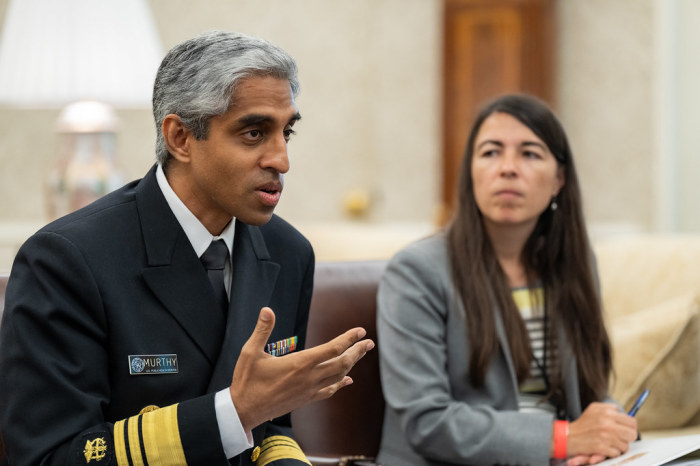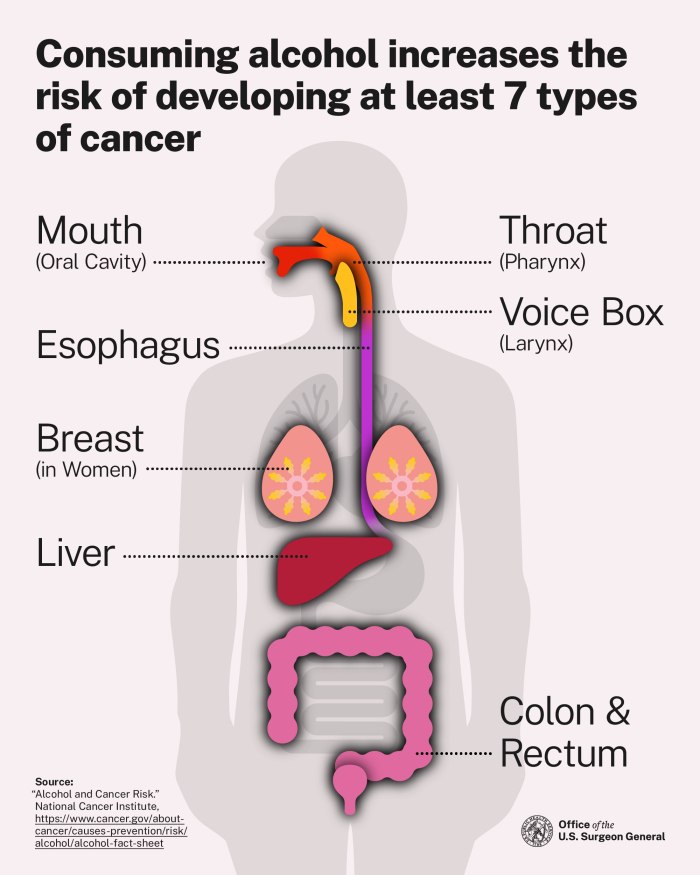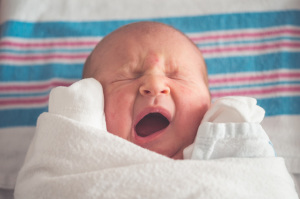Surgeon General calls for cancer warning on alcoholic drinks

U.S. Surgeon General Dr. Vivek Murthy has called for warning labels on alcoholic beverages to include the risk of cancer, citing data showing alcohol consumption leads to 20,000 cancer deaths annually and is the third leading preventable cause of cancer in the United States.
Murthy’s 22-page Surgeon General’s Advisory on Alcohol and Cancer Risk, released Friday, highlights a growing body of research over the last four decades showing alcohol consumption — regardless of the type — increases an individual’s risk for developing at least seven types of cancer.
These include cancers of the breast, colorectum, esophagus, liver, mouth (oral cavity), throat (pharynx) and voice box (larynx). Some 16.4% of total breast cancer cases are attributable to alcohol consumption.
In 2019, an estimated 96,730 cancer cases were related to alcohol consumption, including 42,400 in men and 54,330 in women.
“This translates to nearly 1 million preventable cancer cases over ten years in the U.S. The largest burden of alcohol-related cancer in the U.S. is for breast cancer in women with an estimated 44,180 cases in 2019, representing 16.4% of the approximately 270,000 total breast cancer cases for women,” the advisory notes.
Though 72% of U.S. adults reported consuming one or more drinks per week, less than half of Americans recognize alcohol consumption as a risk factor for cancer. The only other preventable causes of cancer that lead to more cancer cases than alcohol consumption are tobacco and obesity.
“Alcohol is a well-established, preventable cause of cancer responsible for about 100,000 cases of cancer and 20,000 cancer deaths annually in the United States — greater than the 13,500 alcohol-associated traffic crash fatalities per year in the U.S. — yet the majority of Americans are unaware of this risk,” Murthy said in a statement. “This Advisory lays out steps we can all take to increase awareness of alcohol’s cancer risk and minimize harm.”

Research from Barna on Christian sentiment on alcohol consumption published in 2017 shows that while people of faith are less likely to drink alcohol compared with their secular peers, the majority of practicing Christians, 60%, admit to drinking alcoholic beverages. Less than half of Evangelicals (46%) admitted to consuming alcoholic drinks.
It was further noted in the study that some Christian groups, like Evangelicals and Methodists, encourage abstinence to prevent drunkenness. But if they do drink, they generally consume less than the average adult in a given week.
“Just 2 percent of evangelicals acknowledge that they sometimes consume too much alcohol,” researchers said.
In addition to including cancer risk on the warning labels of alcoholic beverages, Murthy called for a reassessment of the guideline limits for alcohol consumption to account for cancer risk.
Though some 83% of the estimated 20,000 U.S. alcohol-related cancer deaths per year occur at levels above the 2020-2025 U.S. Dietary Guidelines for Americans recommended limits of two drinks daily for men and one drink daily for women, the remaining 17% occurred within those recommended limits.
Among other things, Murthy’s advisory calls for the strengthening and expansion of education efforts to increase general awareness of the risk of cancer presented by alcohol consumption and alcohol screenings in clinical setting.
“The amount of alcohol a person drinks affects their risk of cancer. An important factor is the overall amount of alcohol consumed consistently over time. The risk of cancer increases as the level of consumption increases with higher risk at higher levels of consumption,” the advisory explains. “For certain cancers, like breast, mouth, and throat cancers, evidence shows that this risk may start to increase around one or fewer drinks per day.”
Contact: leonardo.blair@christianpost.com Follow Leonardo Blair on Twitter: @leoblair Follow Leonardo Blair on Facebook: LeoBlairChristianPost





























